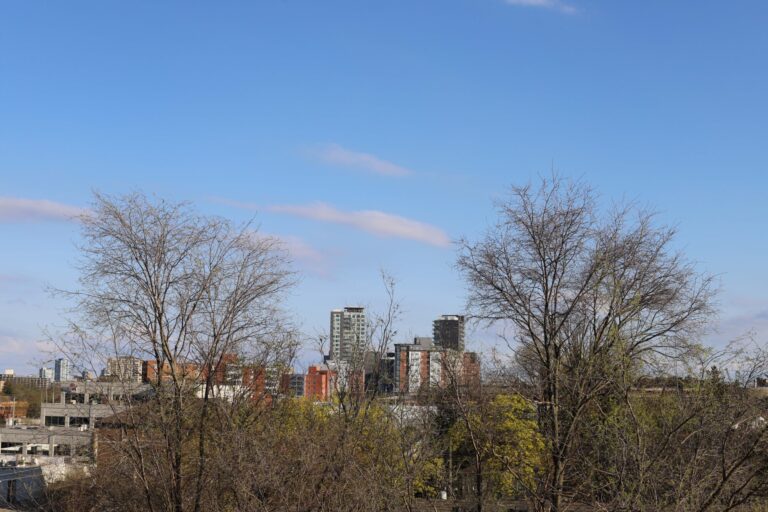On Apr. 22, Waterloo Region joined the global celebration of Earth Day. We saw groups come together for community cleanups as well as planting trees and connecting with Indigenous customs.
This Earth Day came after the warmest winter on record, with century-old temperature records shattered. What is less clear is what this means for us, aside from less outdoor ice skating.
What does a changing climate mean for Waterloo Region?
A 2015 report from the University of Waterloo, forecast our region warming by 3°C to 4°C in 50 years due to climate change. In terms of warmer winters, we can expect to see an average winter temperature of -5°C increase to 0°C by the 2070s! By the 2050s, we’ll have twice as many heat waves, and, by the 2080s, triple. Days over 31°C will increase from six per year to around 50 by the 2070s. Also, by the 2070s, total precipitation will increase by eight per cent.
A 2022 Waterloo Public Health report warns that extreme weather will harm our health here in Waterloo Region—and it’s the people who are already at risk who will suffer the most.
According to the UN International Panel on Climate Change (IPCC), it is expected that we will globally see: increased crop failures, increased desertification in some regions, increased rainfall and storms in other regions, collapses of fisheries, increased conflict over resources like water, and mass displacement, among other harms. Such disturbances will have ripple effects that we cannot simply hide from. We are already starting to experience increased food costs from some of these effects, and it is expected global yearly food price inflation from climate change will reach 1.5-1.8 per cent within a decade.
What is being done locally to address the climate crisis?
There is some good news: there has been significant organizing efforts by numerous community groups to tackle the climate crisis.
After six years of hard work, the group Fossil Free uWaterloo pressured the University of Waterloo to pull its money out of fossil fuel investments, which amounted to $68 million. Hold the Line Waterloo Region mobilizes the community in defense of the Countryside Line urban development boundary.
CycleWR organizes for improved bike infrastructure and Red Raccoon Bike Rescue repairs bikes for almost nothing—empowering lower-income folks to sustainably get around. Community gardens have sprung up, with networks of people learning to grow food together locally. Other notable local activist groups include Fridays for Future – KW, ClimateActionWR and GroundUpWR.
What is Waterloo Region’s contribution to climate change?
It is common knowledge that we need to cut down on greenhouse gases like carbon dioxide, which come from burning oil, coal, and gas. Less known is the fact that Canada is one of the worst emitters per person, placing 15th globally.
We have seen the election of Green Party politicians, representing desire within our community for more action on climate change. Waterloo Region has also set bold goals of a 50 per cent reduction in greenhouse gasses by 2050 and an 80 per cent reduction by 2080, with some encouraging but modest actions and progress. Unfortunately, we are still like much of Canada, which has seen only a 14 per cent reduction in per person emissions since 1990, far short of the 50 percent reduction needed by 2030 to meet the Paris Agreement that Canada signed to limit emissions.
Why isn’t more being done?
Much of the needed action is blocked or delayed by entrenched capitalist interests. For example, federally, we see massive subsidies of billions of dollars a year for fossil fuel infrastructure and companies, with no plans of phasing out fossil fuel production. Provincially, we see Doug Ford spending $230 million to scrap existing green energy projects to keep gas plants operating. Locally, we continue to see speculation of land outside urban boundaries by local real estate and land development companies, who are very well organized and known to lobby for more easy-to-build car-dependent suburban sprawl, instead of walkable and sustainable complete medium density developments.
What is to be done?
There are dedicated organizers and volunteers in the region, who offer great inspiration and hope. With that said, the scale of action required to eliminate fossil fuel use requires a complete overhaul of how our society operates.
Ecological economists say we need a new type of economy – one which does not require endless group and also uses fewer resources while still improving our quality of life.
This would include massive reductions of the wealth of the rich and much better social services and public transit. Some propose eco-socialism as a solution to get at the capitalist root of the problem. Similarly, some Indigenous nations have proposed The Red Deal: Indigenous Action to Save Our Earth. Others, more trusting of the capitalist system, instead propose a rapid transition off fossil fuels by undergoing a temporary planned “war economy” like Canada did in WWII, but this time to mobilize to fight the climate crisis. Any of these will require mass organization and mobilization, some of which is already being done locally.
Beyond policies, collective organization must also consider class interests—big business and developers hold conflicting interests to ours and currently have much more political and economic power. In the end, we need to replace our political systems, so that they are not designed for the wealthy to control, but instead function as an actual democracy of the working class and Indigenous nations. Only then can we democratically plan our economic activity to fall within ecological limits while meeting everyone’s needs.
This will require each of us to join in and help integrate our fragmented but growing local and global organizing efforts, such as the groups described above. We also need these or new groups to build a united front to take on entrenched capitalist interests and make the changes we, our community and our Earth need. Along the way, we get to develop our collective creativity to imagine and co-create a better future for all.

